
Earthling is the 21st studio album by the English musician David Bowie, released on 3 February 1997 through RCA Records in the United Kingdom, Virgin Records in the United States, and Arista Records/BMG in other territories. Mostly self-produced by Bowie, it was primarily recorded from August to October 1996 at New York City's Looking Glass Studios. Bowie composed the tracks with Reeves Gabrels and Mark Plati, who are credited as co-producers, with Mike Garson, Gail Ann Dorsey and Zack Alford providing overdubs later.
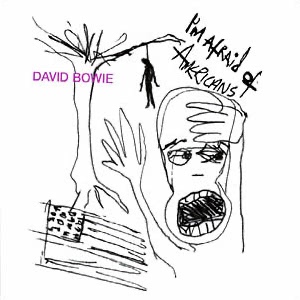
"I'm Afraid of Americans" is a song by the English musician David Bowie, released as a single from his album Earthling on 14 October 1997 through Virgin Records. The song was co-written by Bowie and Brian Eno and originally recorded during the sessions for Bowie's 1995 album Outside; this version was released on the soundtrack of Showgirls (1995). The song was then remade during the sessions for Earthling, featuring rewritten lyrics, overdubs and transposed verses. An industrial and techno track, it presents a critique of America through the eyes of a stereotypical "Johnny" and is characterised by drum patterns, synthesisers, various loops and vocal distortions.

Reeves Gabrels is an American guitarist, songwriter and producer. Currently a member of The Cure since 2012, Gabrels is also known for his work with David Bowie and Tin Machine from 1987 to 1999. He also fronts the band Reeves Gabrels & His Imaginary Friends, which is based in Nashville.

Tin Machine is the debut studio album by the Anglo-American hard rock band Tin Machine, released on 22 May 1989 through EMI America Records. The band consisted of the English singer-songwriter David Bowie, the American guitarist Reeves Gabrels and brothers Tony Fox and Hunt Sales on bass and drums, respectively, while Englishman Kevin Armstrong acted as an additional guitarist. The project was spearheaded by Bowie, who felt disconnected in his career by 1987 and looked to reinvent himself. After meeting Gabrels through his Glass Spider Tour, the two agreed to work together and would collaborate frequently for the next decade. Bowie hired the Sales brothers, neither of whom he had worked with since the 1970s, after a meeting in Los Angeles, while English producer Tim Palmer was hired to co-produce.

Tin Machine II is the second and final studio album by the Anglo-American rock group Tin Machine, released on 2 September 1991 through Victory Music. The band, composed of David Bowie, Reeves Gabrels on guitar and brothers Tony Fox and Hunt Sales on bass and drums, respectively, recorded it in Sydney, Australia in late 1989 at the conclusion of the Tin Machine Tour. After Bowie completed his solo Sound+Vision Tour in late 1990, recording resumed in Los Angeles, California until March 1991. The production was handled by Tin Machine and Tim Palmer, who produced their debut studio album (1989), with additional production by Hugh Padgham on "One Shot". While the album musically retains a hard rock sound, the songs are more melodic compared to its predecessor, with lyrics focusing on love.

Hours is the 22nd studio album by the English musician David Bowie. It was originally released on 21 September 1999 through the Internet on the artist's website BowieNet, followed by a physical CD release on 4 October through Virgin Records. It was one of the first albums by a major artist available to download over the Internet. Originating as a soundtrack to the video game Omikron: The Nomad Soul (1999), Hours was the final collaboration between Bowie and guitarist Reeves Gabrels, with whom he had worked since 1988. The album was recorded in mid-1999 between studios in Bermuda and New York City. A song contest conducted on BowieNet in late 1998 resulted in a fan contributing lyrics and backing vocals to one of the tracks.

"The Hearts Filthy Lesson" is a song by English musician David Bowie from his 20th studio album, Outside (1995), and issued as a single ahead of the album. It showcased Bowie's new, industrial-influenced sound. Lyrically, the single connects with the rest of the album, with Bowie offering a lament to "tyrannical futurist" Ramona A. Stone, a theme continued in subsequent songs. The song is also meant to confront Bowie's own perceptions about the ritual creation and degradation of art. It appears in the end credits of the 1995 film Seven.

Tin Machine Live: Oy Vey, Baby is a live album by Anglo-American rock band Tin Machine, originally released through London Records on 2 July 1992. The album includes songs, all from the band's two albums, recorded between 20 November 1991 and 11 February 1992 from five different venues on the North American and Asian legs of Tin Machine's It's My Life Tour. The maligned album title was intended as a pun on U2's 1991 album Achtung Baby. Oy Vey, Baby has received negative reviews, with many criticising the performances. It failed to chart in both the UK and the US. It was accompanied by a concert video of the same title, which was filmed at The Docks, Hamburg on 24 October 1991. Following its release, Tin Machine disbanded and Bowie quickly resumed his solo career with Black Tie White Noise (1993).

"Baby Universal" is a song by Anglo-American hard rock band Tin Machine, released as the second single from their Tin Machine II album in October 1991.
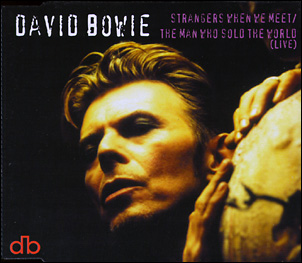
"Strangers When We Meet" is a song by English musician David Bowie, originally recorded for his 1993 album The Buddha of Suburbia. In 1995, Bowie re-recorded the song for his Outside album, and this version was edited and released as the second single from the album, paired with a reworked version of Bowie's 1970 song "The Man Who Sold the World".

"Queen Bitch" is a song by the English singer-songwriter David Bowie. It was originally released on his 1971 album Hunky Dory before appearing as the B-side of the single "Rebel Rebel" in the United Kingdom in early 1974. Co-produced by Bowie and Ken Scott, the lineup consisted of the musicians who would later become known as the Spiders from Mars: Mick Ronson, Trevor Bolder and Mick Woodmansey.

"Stay" is a song by the English musician David Bowie, released on his 1976 album Station to Station. The song was recorded in late 1975 at Cherokee Studios in Los Angeles. Co-produced by Bowie and Harry Maslin, the recording featured guitarists Carlos Alomar and Earl Slick, bassist George Murray, drummer Dennis Davis, pianist Roy Bittan and Warren Peace on percussion. The track features prominent dual guitar work from Slick and Alomar, who mostly composed it in the studio. Based on the chord structure of "John, I'm Only Dancing (Again)", a funk reworking of "John, I'm Only Dancing" (1972), "Stay" emulates funk rock, soul and hard rock. The song's lyrics are abstract and relate to love.

"Look Back in Anger" is a song written by English artists David Bowie and Brian Eno for the album Lodger (1979). It concerns "a tatty 'Angel of Death'", and features a guitar solo by Carlos Alomar.

"Little Wonder" is a song by English musician David Bowie, released as the second single from his 21st album, Earthling (1997). "Little Wonder" backed by three remixes, was issued on 27 January 1997. The single was a success, peaking at number 14 in the UK and topping the chart in Japan. The accompanying music video was directed by Floria Sigismondi and depicts Bowie at three different ages. Biographer David Buckley considers it a dance-oriented video rather than a rock one, reminiscent of Orbital's "The Box" (1996).
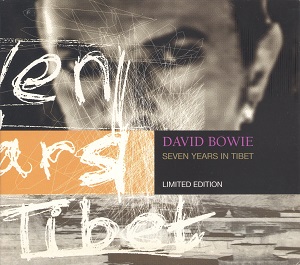
"Seven Years in Tibet" is a song written by English musician David Bowie and Reeves Gabrels from the 1997 album, Earthling. It was released as the album's fourth single. In some territories, a version of the song sung by Bowie in Mandarin Chinese was released as "A Fleeting Moment".

"Survive" is a song by the English musician David Bowie from his 1999 album Hours. It was later released in remixed form as the album's third single on 17 January 2000, reaching number 28 in the UK. Written by Bowie and Reeves Gabrels, it is a reflective number detailing the end of a relationship. Musically, it recalls the sound of Bowie's folk rock music of the late 1960s, and 1971's Hunky Dory. Its music video echoes the reflective quality of the recording, portraying Bowie levitating at a kitchen table with an egg. Praised as a highlight of Hours, Bowie performed "Survive" frequently through 1999 and 2000.
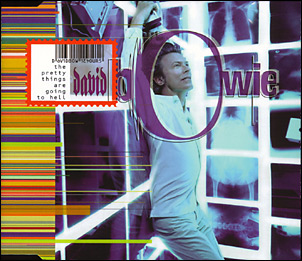
"The Pretty Things Are Going to Hell" is a song by the English musician David Bowie from his 1999 album Hours. Written by Bowie and Reeves Gabrels, its title references past songs such as "Oh! You Pretty Things" and the Stooges' Raw Power track "Your Pretty Face Is Going to Hell". On Hours, the song is a rockier number that contains elements of 1970s glam rock. The lyrics offer views on disillusionment and aging. The song was first released in a different mix in the film Stigmata before being released as the first single from the album in Australia and Japan, replacing "Thursday's Child". An unreleased music video was filmed that depicted Bowie encountering several of his past personas. It was performed live in 1999 and 2000.

LiveAndWell.com is a 1999 limited edition live album by David Bowie. It was not available commercially and could only be acquired by being subscribed to BowieNet at the time. The album is made up of recordings from the 1997 Earthling Tour, featuring songs from the albums Outside (1995) and Earthling (1997)

The Earthling Tour was a concert tour by the English musician David Bowie, in promotion of his album Earthling, released in 1997, The tour started on 7 June 1997 at Flughafen Blankensee in Lübeck, Germany, continuing through Europe, North America before reaching a conclusion in Buenos Aires, Argentina on 7 November 1997.
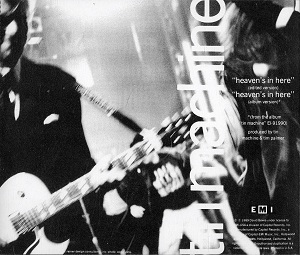
"Heaven's in Here" is the lead track from the eponymous debut album by the Anglo-American hard rock band Tin Machine. Written by David Bowie, it was released as a promotional lead single from the album in 1989.



















